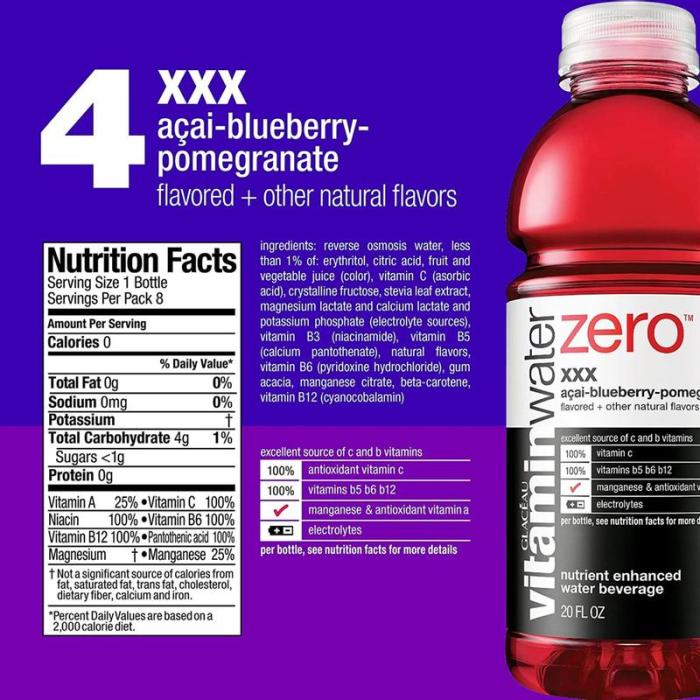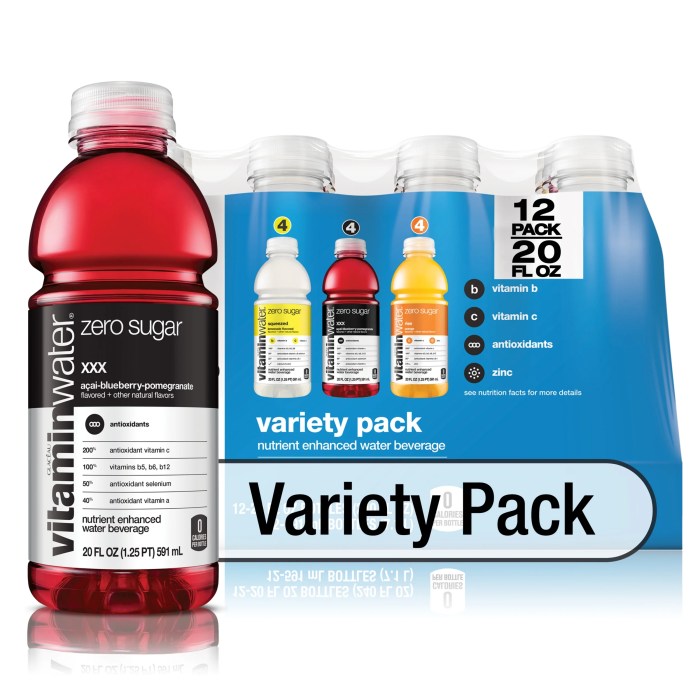Nutritional Information Analysis
Zero vitamin water nutrition facts – My dear friends, let us delve into the heart of the matter – the nutritional composition of Zero Vitamin Water. Understanding its contents is crucial for making informed choices about our well-being. This analysis will illuminate the significance of each ingredient within the context of a balanced and healthy lifestyle.
Zero Vitamin Water Nutritional Facts
The following table presents the nutritional information for a typical serving of Zero Vitamin Water. Remember, individual values might slightly vary depending on the specific flavor. Always refer to the label on your bottle for the most accurate information.
| Nutrient | Amount per Serving | % Daily Value | Health Significance |
|---|---|---|---|
| Calories | 0 | 0% | Zero calories contribute to weight management and help maintain a healthy energy balance. |
| Total Fat | 0g | 0% | Absence of fat aligns with recommendations for limiting saturated and trans fats in the diet. |
| Sodium | Sodium intake should be monitored to maintain healthy blood pressure levels. The amount in Zero Vitamin Water is generally low. | ||
| Total Carbohydrate | 0g | 0% | Zero carbohydrates indicate the absence of sugars, contributing to better blood sugar control. |
| Sugars | 0g | 0% | The absence of added sugars is beneficial for dental health and overall metabolic well-being. |
| Protein | 0g | 0% | Protein is essential for building and repairing tissues; however, Zero Vitamin Water is not a primary source. |
| Vitamin C | Vitamin C is an antioxidant vital for immune function and collagen production. | ||
| Other Vitamins & Minerals (if any) | The presence of other vitamins and minerals enhances the nutritional profile, contributing to overall health. Specific vitamins and their amounts will vary by flavor. |
Nutritional Profile Comparison
Imagine a visual representation: three bars side-by-side. The first represents Zero Vitamin Water, a slender bar showcasing minimal calories, sugars, and fats. The second bar, representing a typical soda, is significantly taller, reflecting high sugar and calorie content. The third, representing a fruit juice, shows a moderate height with natural sugars and some vitamins, but still significantly more calories than Zero Vitamin Water.
This comparison highlights Zero Vitamin Water’s low-calorie, low-sugar profile compared to other popular beverages.
Sugar Content and Sweeteners

My dear friends, let’s delve into the sweet, yet sometimes deceptive, world of sweeteners in Zero Vitamin Water. Understanding the types of sugars and their impact on our well-being is crucial for making informed choices about our hydration. We’ll explore the specific sweeteners used, their potential effects on our bodies, and compare them to other popular beverages. Remember, knowledge is power, and empowered choices lead to a healthier and more vibrant life.The primary sweetener in Zero Vitamin Water is typically sucralose, a zero-calorie artificial sweetener.
Other brands might use stevia or a blend of artificial sweeteners. These artificial sweeteners offer a sweet taste without the calories found in traditional sugars like sucrose (table sugar) or fructose (fruit sugar). However, it’s important to note that the long-term effects of artificial sweeteners are still under investigation.
Types of Sweeteners Used in Zero Vitamin Water
Zero Vitamin Water brands often utilize sucralose, a chlorinated derivative of sucrose. It is approximately 600 times sweeter than sugar. Some formulations may also incorporate stevia, a natural, plant-derived sweetener. The exact blend varies between brands and specific product lines. Understanding the specific sweetener(s) used requires careful examination of the product’s label.
Always check the ingredients list for accurate information.
Potential Health Effects of Artificial Sweeteners
While artificial sweeteners offer a calorie-free alternative to sugar, some studies suggest potential short-term effects such as digestive upset, headaches, and even increased cravings for sweet foods in susceptible individuals. Long-term effects are still being researched, and there are ongoing debates about their potential link to metabolic issues, such as changes in gut microbiota composition. More research is needed to fully understand the long-term implications of regular consumption of artificial sweeteners.
It’s crucial to approach these sweeteners with mindful moderation.
Comparison of Sugar Content with Other Beverages
Let’s compare Zero Vitamin Water to other common beverages. A typical can of regular soda contains a significant amount of sugar, often exceeding 30 grams. In contrast, Zero Vitamin Water, by its very nature, contains zero sugar. However, unsweetened beverages like plain water or unsweetened tea naturally contain no added sugar. While Zero Vitamin Water avoids added sugar, it’s important to consider that the long-term effects of artificial sweeteners are still being explored.
This comparison highlights the significant difference in sugar content between sugar-sweetened beverages and both Zero Vitamin Water and naturally unsweetened options. The choice ultimately depends on individual preferences and health considerations.
Electrolyte Balance and Hydration

Zero Vitamin Water, in its quest to offer a refreshing and revitalizing experience, incorporates a blend of electrolytes. These essential minerals, including sodium, potassium, and magnesium, play a pivotal role in maintaining proper hydration and overall bodily function. Understanding their contribution is key to appreciating the beverage’s impact on your well-being.Electrolytes work synergistically to regulate fluid balance within the body.
They facilitate the movement of water across cell membranes, ensuring proper hydration at a cellular level. Sodium, for instance, helps to draw water into the bloodstream, while potassium assists in moving water into cells. This delicate balance is crucial for optimal cellular function and overall health. A deficiency in electrolytes can lead to dehydration, muscle cramps, and fatigue.
Electrolyte Replenishment After Physical Activity
Zero Vitamin Water’s effectiveness in replenishing electrolytes after exercise warrants careful consideration. While plain water is essential for rehydration, it lacks the electrolytes lost through sweat during physical activity. Sports drinks, on the other hand, often contain high levels of sugar alongside electrolytes. Zero Vitamin Water presents a middle ground, offering electrolytes without the added sugars, making it a potentially healthier choice for post-workout recovery for individuals mindful of their sugar intake.
The specific electrolyte content of Zero Vitamin Water, however, should be compared to individual sweat loss to determine its sufficiency for intense or prolonged exercise. For less strenuous activities, its electrolyte profile may be adequate for rehydration.
Comparison of Electrolyte Profiles
The following comparison highlights Zero Vitamin Water’s electrolyte profile relative to other electrolyte-enhanced beverages. Note that the exact composition may vary depending on the specific flavor and formulation of each beverage. Always refer to the product label for the most accurate information.
- Zero Vitamin Water: Typically contains a moderate level of sodium, potassium, and possibly other electrolytes like magnesium. The precise amounts vary depending on the flavor. Its key feature is the absence of added sugars.
- Sports Drinks: Often contain a higher concentration of electrolytes, especially sodium, to rapidly replenish losses during intense exercise. However, they usually contain significant amounts of added sugar for palatability and energy provision.
- Coconut Water: Naturally contains electrolytes, primarily potassium, and is a popular choice for rehydration. However, its electrolyte profile may not be as comprehensive or precisely balanced as some formulated beverages.
- Electrolyte Tablets/Powders: These provide a customizable way to add electrolytes to water. This allows for precise control over electrolyte intake, but requires preparation and may not be as convenient as ready-to-drink options.
Vitamin Content and Benefits
My dear friends, let us delve into the heart of Zero Vitamin Water, exploring the vital nutrients that nourish our bodies from within. Understanding the vitamin profile is crucial to appreciating its role in our overall well-being. We’ll examine the specific vitamins present and their contributions to our health, painting a vivid picture of how these essential components support our daily lives.
Vitamin Composition of Zero Vitamin Water
Zero Vitamin Water, in its commitment to providing essential hydration, often includes a blend of vitamins tailored to support various bodily functions. While the precise vitamin content can vary depending on the specific flavor and formulation, a typical serving might contain small amounts of vitamins such as Vitamin C and Vitamin B vitamins. It is crucial to consult the specific nutrition label of the product for accurate and up-to-date information on its vitamin content.
This detailed analysis will illuminate the benefits associated with these vitamins.
Benefits of Vitamins in Zero Vitamin Water
The vitamins present, though in relatively small quantities, play significant roles in our health. Vitamin C, for example, is a potent antioxidant, protecting our cells from damage caused by free radicals. It also plays a crucial role in collagen synthesis, vital for healthy skin, bones, and connective tissues. The B vitamins are a group of essential nutrients involved in energy metabolism, supporting our body’s ability to convert food into energy.
Right, so zero vitamin water, innit? Properly lacking in, like, everything. Makes you wonder what’s in that stuff, compared to, say, the mega-calories in a rasher or two – check out the kirkland bacon nutrition facts if you’re gassed. Anyway, back to the zero vitamin water – it’s basically just water, which, let’s be honest, isn’t exactly brimming with goodness, is it?
These vitamins are critical for nerve function, red blood cell formation, and maintaining healthy cell growth and function. While Zero Vitamin Water may not be a primary source of these vitamins, its contribution can be considered a beneficial addition to a balanced diet.
Comparison to Other Vitamin-Enhanced Beverages, Zero vitamin water nutrition facts
Let’s now compare the vitamin content of Zero Vitamin Water to other vitamin-enhanced beverages available in the market. A detailed comparison would require analyzing the specific vitamin profiles of each beverage, which can vary significantly. For instance, some fruit juices may contain considerably higher amounts of Vitamin C, while other enhanced water brands may offer a wider range of B vitamins or other micronutrients.
However, the advantage of Zero Vitamin Water lies in its low-calorie, low-sugar profile, making it a potentially healthier choice for those seeking hydration with a touch of added vitamins. Ultimately, the “best” choice depends on individual nutritional needs and preferences.
Overall Assessment and Alternatives
Zero Vitamin Water presents a complex picture. While it offers a refreshing hydration option with added vitamins and electrolytes, its reliance on artificial sweeteners and relatively high sugar content (even if from a sugar substitute) raises concerns for long-term health. Its place within a balanced diet requires careful consideration. The benefits are undeniable for those seeking a convenient way to increase vitamin intake and replenish electrolytes, particularly after exercise.
However, over-reliance on such beverages could lead to an imbalance in nutrient intake and potential negative consequences associated with artificial sweeteners.The key lies in moderation and mindful consumption. Zero Vitamin Water should not be considered a primary source of hydration or vitamins but rather a supplementary beverage enjoyed occasionally as part of a varied and balanced diet. Excessive consumption could potentially disrupt blood sugar levels, even with artificial sweeteners, and displace more nutrient-rich choices.
A holistic approach to hydration and nutrition is paramount.
Healthier Beverage Alternatives
Several healthier alternatives provide similar benefits without the potential drawbacks of Zero Vitamin Water. These options often emphasize natural ingredients, reduced sugar content, and a more balanced nutrient profile. Choosing these alternatives allows for a more sustainable and healthful approach to hydration and vitamin supplementation.
| Beverage | Sugar Content (per serving) | Vitamin Content | Electrolyte Content |
|---|---|---|---|
| Coconut Water | Naturally occurring sugars, varies depending on brand and type; generally lower than Zero Vitamin Water | Contains natural electrolytes and some vitamins (potassium, magnesium) | Naturally high in potassium, magnesium, and other electrolytes. |
| Infused Water (e.g., cucumber, lemon, mint) | Zero added sugar | Minimal vitamin content, depending on the infused ingredients. | Minimal electrolyte content. |
| Homemade Electrolyte Drink (water, fruit juice, pinch of salt) | Naturally occurring sugars from fruit juice, controllable amount. | Vitamins from fruit juice, varies depending on the choice of fruit. | Electrolytes from salt and fruit. |
| Diluted 100% Fruit Juice | Naturally occurring sugars, significantly reduced compared to undiluted juice. | Vitamins and antioxidants from the fruit. | Minimal electrolyte content. |
Commonly Asked Questions: Zero Vitamin Water Nutrition Facts
Is Zero Vitamin Water suitable for diabetics?
While it contains zero sugar, the artificial sweeteners may still impact blood sugar levels differently in individuals. Diabetics should consult their doctor before incorporating it into their diet.
Does Zero Vitamin Water cause bloating?
Some individuals may experience bloating due to the artificial sweeteners or other ingredients. This varies depending on individual sensitivities.
Can I use Zero Vitamin Water for rehydration after intense workouts?
While it contains electrolytes, dedicated sports drinks often provide a more balanced and effective electrolyte replenishment after strenuous activity.
Are there any long-term health risks associated with regular consumption?
Long-term effects of consuming artificial sweeteners are still under research. Moderation is key, and a varied diet is always recommended.





